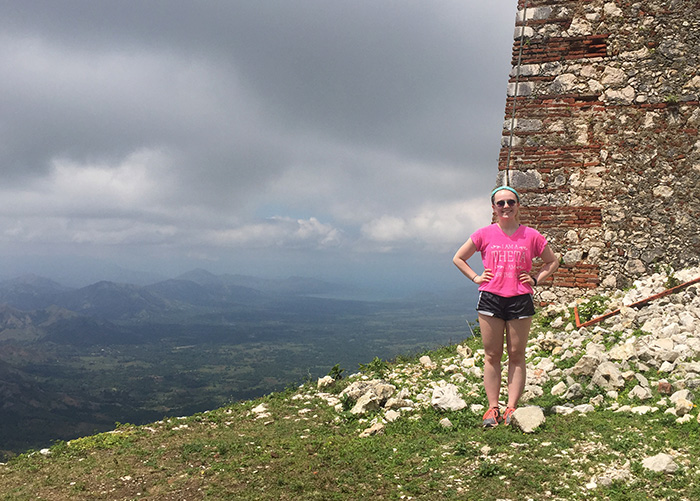The Bee's Knees

Meredith Johnson ’18
Neuroscience major Meredith Johnson ’18 is a dancer, professional harpist, competitive springboard diver and student-researcher who plans to research animal behavior and traveled to Turkey and Greece this summer to study bees, with help from a National Science Foundation (NSF) grant. Below, she discusses her wide-ranging interests, her favorite class, her NSF research on bee movements and rhythms and her work as part of the summer research scholar program at Lehigh Valley Hospital.
Major:
Clubs and Organizations:
Pre-Health Society (president), Neuroscience Club (vice president), Hypnotic, Dance Theatre Group, WILD (Pre-Orientation leader) and Kappa Alpha Theta.
Honors/scholarships/awards:
Dean’s List and Lehigh Valley Hospital Summer Research Scholar.
On choosing a major:
Like many first-year students, I initially did not declare a major, because I wanted to have the freedom to try different classes. After taking introductory neuroscience classes, I found that this major is at the intersection of many disciplines, which is appealing to me.
On choosing Dickinson:
The strong academics, dance opportunities and sense of community I felt on my visits all greatly influenced my decision to choose Dickinson. The willingness of professors and deans to take time out of their schedules to meet with me to answer my questions was very important.
Favorite class so far:
My favorite lab has been Biology 124. The field experiences were what drew me to study animal behavior. We even did a lab with honeybees, which is what I studied this summer!
Most important thing I’ve learned so far:
The importance of managing my schedule, setting goals, planning ahead and giving myself breaks. Spending time in nature or taking a yoga class helps me keep perspective.
Post-Dickinson plans:
I am planning on pursuing medical school or a graduate school program to study animal behavior.
As a kid, I wanted to be …
… a professional ballet dancer or a zoologist. My favorite TV channels were Animal Planet and National Geographic.
Little-known talent:
When I was 7 years old, I began studying the lever harp with my teacher and mentor, Sarajane Williams. At 13, I began to study concert pedal harp, which is much more challenging, because it has seven pedals at the base of the instrument. When I was older, I started teaching myself contemporary pieces, so that I could have a wider selection to play at events like weddings.
Proudest accomplishment:
As a springboard diver throughout my childhood and early high school years, I had to conquer fears of trying a new flip or twist. I remember the first time I attempted an inward dive at a meet. I actually ended up failing the dive, but I learned a lot about how to move past mistakes and keep my head up.
Biggest influence:
Undoubtedly, my parents. They have taught me to think for myself, be strong in my convictions and have compassion and empathy for others. They have been my biggest supporters and I cannot thank them enough for what they continue to do.
About my summer research projects:
After completing my first year at Dickinson, I was accepted to the 2015 summer research scholar program at Lehigh Valley Hospital. I studied music therapy’s effect on sedation requirements in ventilated ICU patients. The program was also very good in providing insights into different areas of healthcare.
This summer, I earned a place in the National Science Foundation funded research experience for undergraduates through the University of Central Oklahoma at Edmond. This allowed me to travel to Turkey and Greece to study the behavior of specialist bees, which forage on only one type of flower, and generalist bees, which visit different types of flowers, and learn more about their importance to our everyday lives as pollinators.
We caught more than 100 bees; placed them in incubators, where they were in constant darkness; and recorded their movements and rhythms. Then we compared the circadian rhythms, or sleep/wake cycles, of specialist and generalist bees that visit the morning glory flower. Specialist bees are thought to have different circadian rhythm than generalist bees, which visit many types of flowers.
As part of the program, we will present our research this winter in New Orleans and learn about the value of scientific conferences in sharing ideas and developing new collaborations with others from all over the world.
What I learned studying bees in Greece and Turkey:
Aside from the research content and learning about the scientific method, we learned about communication challenges and cultural sensitivities that investigators overcome in international collaboration.
I also learned the value of persistence! I consider myself extremely fortunate to have had this experience. The value of relationships and mentoring that programs like these provide is imperative—especially when solving problems in the scientific process. You have to keep planning ahead, applying, and most importantly persevering in order to be successful.
Beyond the project, we learned about contingency planning. We were in Turkey during the coup d'etat and also the attack in Istanbul. Our program leaders had geographically prepositioned the program should there be instability, so we were able to leave through Greece.
Why it’s important work:
Circadian rhythms are the driving force of all living things. We wake up in the morning when we sense sunlight, and go to bed when the sun ceases to shine. This is the first study to compare circadian rhythm behavior of Systropha planidens, Systropha curvicornis, and other generalist, non-Systropha bees, and it brought to light many more questions that I would love to pursue.
Learn more
- Department of Neuroscience
- Academic Opportunities
- Research at Dickinson
- Opportunities for Engagement
- More Student Snapshots
- Latest News
Published December 20, 2016